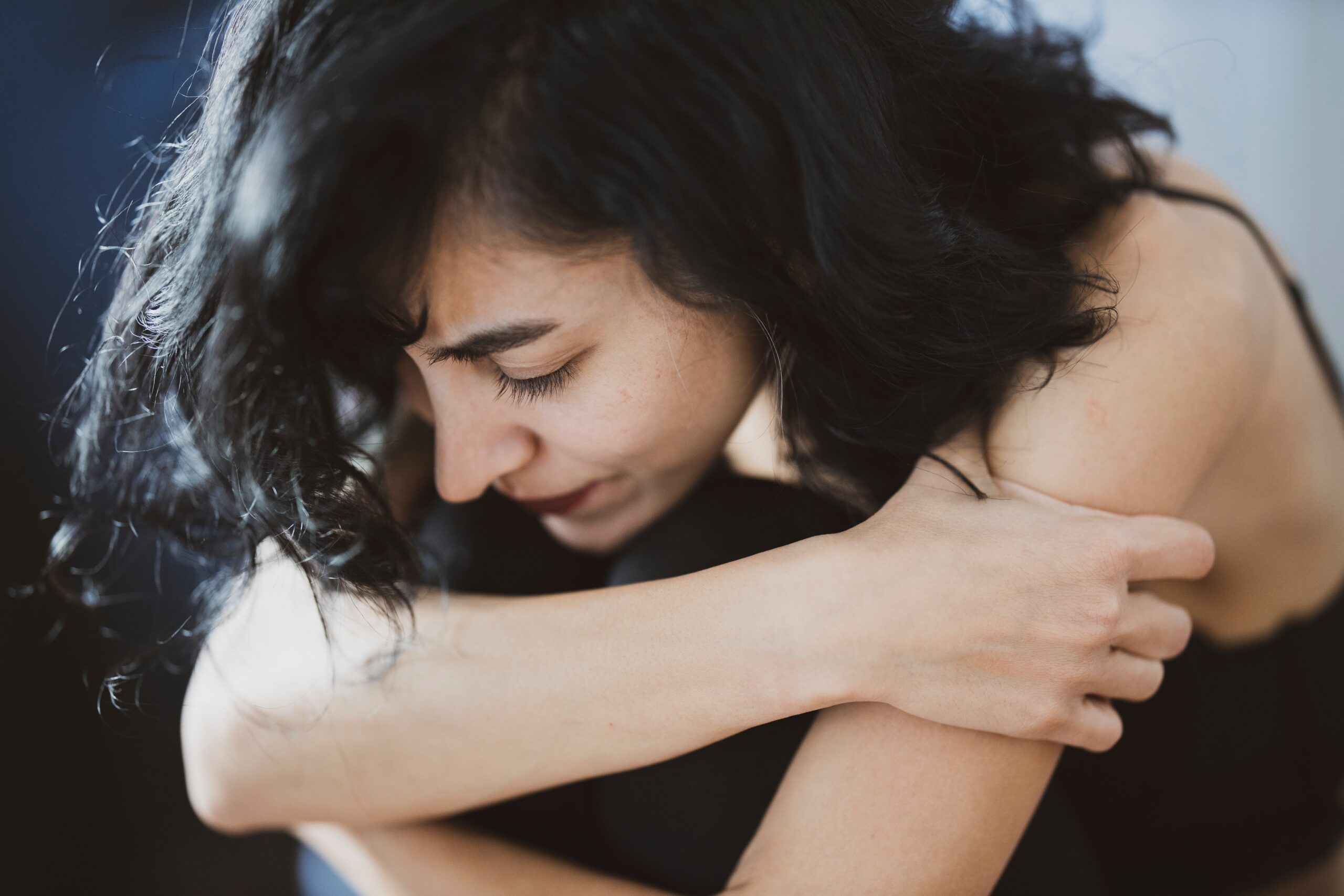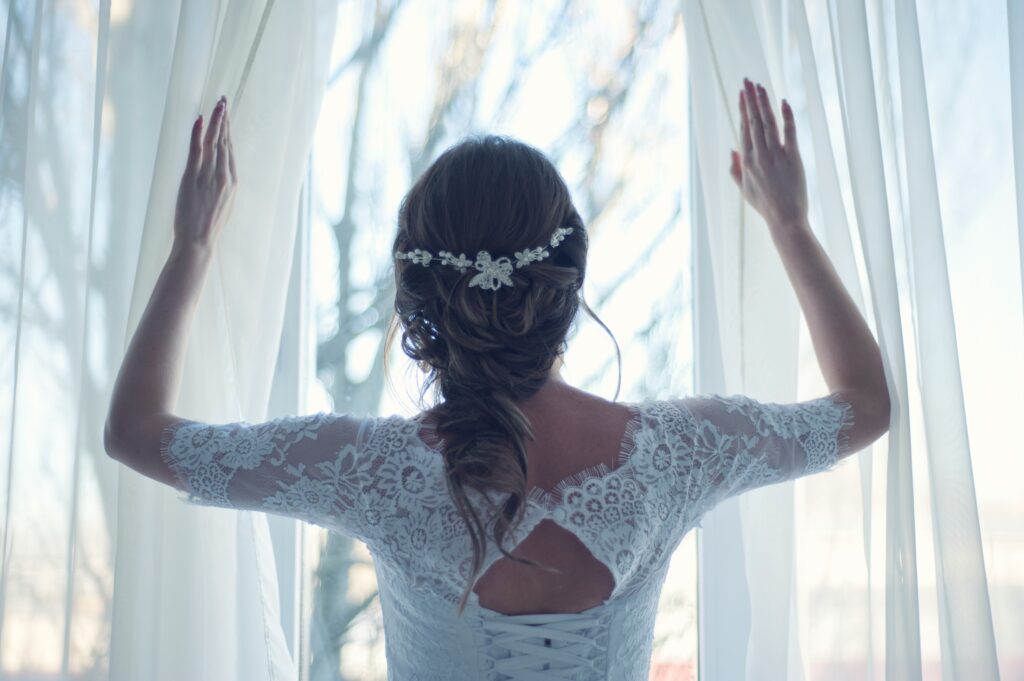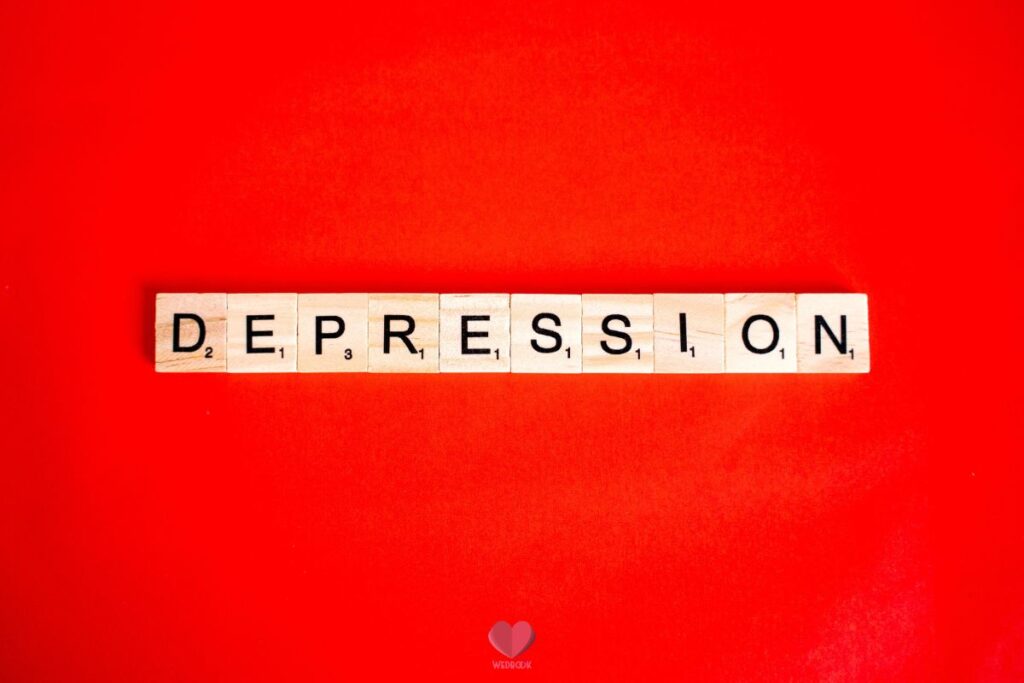Depression after marriage or post-wedding depression is a real thing and more common than you think (around 50% of women experience depressive thoughts in the first year of their marriage). The grief of never being the bride again, settling for new changes in married life, communication with in-laws, and financial conflicts can all lead to stressors and mental challenges.
10 Signs You’re Suffering From Depression After Marriage
#1 Persistent Feelings of Sadness or Hopefulness
You’re feeling down or low a lot of times. Even things that used to give you joy don’t feel particularly pleasing or enjoyable at the moment.
#2 Loss Of Interest In Activities
The activities you were excited about don’t feel that thrilling anymore. Probably you liked cooking or outdoor games and now you find indulging in them less & less and lacking the willpower to arrange them in your schedule.
#3 Change In Appetite or Weight
Everyone reacts to stress & depression differently. Some lose weight because they don’t feel like eating anything. Others gain weight because they crave sugar or junk to deal with the feelings of depression after marriage.
#4 Difficulty Sleeping
You aren’t able to sleep as calmly as you were before. Your sleeping schedule has been disrupted because of unwanted negative feelings and anxiety, exacerbating your post-marriage depression.
#5 Fatigue or Lack Of Energy
There’s a sudden loss of motivation in general activities. You could also lose passion for your work and feel low on energy all the time. Feeling tired and lacking energy is a major symptom of not just depression after marriage, but depression, in general.
#6 Difficulty Concentrating
Those who are suffering from depression after marriage can have trouble focusing or making any sort of decisions. They will suddenly feel disorganized and seem to forget a lot of things.
#7 Feelings of Worthlessness or Guilt
With all these negative emotions taking over you, you can experience feelings of worthlessness and guilt. Depression after marriage can hit you hard because you’re hoping to experience marital bliss when all these emotions take over you and there’s an internal struggle that can hold you down.
#8 Irritability or Restlessness
Even the smallest things can annoy you or put you off when you’re suffering from depression after marriage. You can also feel restless and might feel like there’s trouble staying still.
#9 Physical Symptoms
When you keep feeling depressed after a wedding, the psychological symptoms can manifest into physical ones and you can start experiencing symptoms like muscle pain, headaches, stomach aches, or gut issues.
#10 Thoughts of Self-Harm or Suicide
When there are persistent feelings of depression, the individual might become suicidal. If you’re experiencing such thoughts, it’s important you speak to someone close to you and get professional help for your mental health immediately.
7 Reasons For Depression After Marriage

#1 You Have Nothing To Do Now!
Planning a wedding can be quite consuming, and can take up a lot of your free time and mind space. When the planning is over, you might feel an empty space in your life. You also likely made many memories with your fiancee during the planning stage and now the excitement is over. This can cause a feeling of personal low but can also lead to a void in your relationship. If you have planned the honeymoon up close, then you might start feeling it after coming back from your vacation, leading to symptoms of depression after marriage.
“We planned our wedding for 8 months and all my free time during that period went into planning all the details of our ceremony and events before that like rehearsal dinner and bridal party. When the wedding and honeymoon were over, I was kind of left with this huge hollow in my life and didn’t know how to get out of it. After some weeks of the slump, my husband suggested channeling my energy somewhere else and I set two goals for my life. One professional: to get two new clients, and the other personal: to do more weight-lifting. Making these goals helped me channel my energy quite well,” says Alisha, who married 8 months ago in San Francisco, California.
#2 You’re Not In Spotlight Anymore
Did you know? Weddings are nothing but a big, oxytocin party. Everyone involved experiences a huge surge of oxytocin and who experiences the most surge? The bride – it’s been proven by research. Of course, when this surge decreases you’re bound to feel a little depressed and sad.
We all crave attention. Some people more than others. Some also need attention when they didn’t receive enough of it in their childhood. As you come into the spotlight leading up to the wedding day and on the wedding day, you will love being the center of attention and when it all goes away, it can prop up many negative feelings that can also make you question your worth or prop up feelings of desire for the same attention.
“I have worked as a stage manager and after a closing night, I always feel some sort of lack in my life. I thought the post-wedding depression might not affect me, but it did! I was fortunate to get some weeks off my office to focus on my mental health. But for those who can’t, I’d suggest going easy on yourself,” says Karina who got married 4 months ago.
#3 Unrealistic Pressure Of Newlywed Life
“Marital Bliss”: a term that has lost all meaning when you’re suffering from depression after marriage. When two people get married, there’s often this pressure of things being rosy and happy. After all, you’re in your honeymoon phase. This can lead you to expect that marriage should be all about happiness and sex and togetherness with no fights whatsoever. However, the reality is different, and you can experience problems with your husband making you question everything.
In fact, many couples find the days after their wedding monotonous, especially the ones who schedule their honeymoon right after the wedding and have given themselves no time to settle into their new life. The excitement of wedding planning then the actual wedding and then the honeymoon is something the daily life can’t match and you’re just craving that adrenaline rush again, leading to feelings of longing and aching desire.
Many couples who spend a lot of their time planning the wedding can also feel hollow in their relationship and don’t know what else to talk about! This can make them feel the wedding planning and a disconnect from each other leading to symptoms of depression after a wedding.
#4 Difficulty Communicating With In-Laws
The relationship with in-laws can be a significant factor in post-wedding depression for some individuals. Newlyweds can face increasing interference by in-laws after marriage, which can lead to a lack of boundaries and conflicting expectations. This can also lead to problems in your marital life, especially if your partner doesn’t see any issue with his family and your dynamics with them.
“I was already kind of dealing with a bit of stress after marriage due to financial load and my in-laws certainly didn’t make it better. My MIL used to visit every week and used that day to point out all that I was doing wrong around the house. I and my partner had a big fight after she left, turning my stress into depression after marriage,” says Cate who has been married for 13 months.
The problem with in-laws can be tricky because it isn’t something that will last only for a small time. It’s there to stay and tackling them is important, especially if it’s with a mother-in-law because a mother-in-law often ruins marriage. Open communication, setting healthy boundaries, and seeking support from a mental health professional can be helpful in managing these issues and promoting emotional well-being.
#5 Adjusting To The New Life
Marriage is a huge life transition and even though you might be expecting these changes, experiencing them is a whole different thing. Adjusting to this new marital life means having a new routine, new living arrangements, and new responsibilities. If the couple hasn’t lived together before marriage, they can see some new aspects of their partner which can lead to conflicts. The household responsibilities and the addition of a new family can become overwhelming and can lead to stress and anxiety, which can contribute to depression.
“My husband and I were thrilled about getting married and we have already lived together for some time. But after marriage, something changed. There was a feeling of deeper commitment and we both panicked and fought over minor issues. Thankfully, things got better after we sought couple’s counseling for a few weeks,” says one newly-wed on adjusting to married life after 5 years of dating.
Sometimes these petty tiffs can also leave you wondering if getting married was a good idea or send you into long-term overthinking. Know that the first year of marriage can be trying for almost everyone but when you talk through things and don’t let spite build-up, having someone by your side for the rest of your life can be the most precious thing to experience!
#6 Financial Responsibility
After the wedding is over, the bills come in! This can lead to a burden and negative thoughts. Weddings are always under a lot of pressure to be perfect and in this game of perfection, couples often inflate their budget and go overboard. When the bills come in, they often regret spending so much on a number of things and the debt or depletion of savings can be a huge hit on their mental health.
Besides the financial burden on the couples, wedding payments are also often made by family members, which sometimes doesn’t go as swiftly. There can be disagreements on whose family pays for what and the pressure from both the bride and groom’s side can cause them to have some conflicts too. This friction can continue after the wedding and cause marital problems and depression after marriage in both partners.
Some couples also don’t talk about and set proper rules in place for their financial arrangements. This can cause some problems in their marital life and add to the monetary pressure of wedding bills as well! Planning a joint financial arrangement, sticking to your budget, and not letting family issues affect your relationship are some ways to manage this cause of depression after marriage.
#7 Regretting Aspects Of The Wedding
You spent hours & hours planning every minute detail of the wedding day and still, some things didn’t go as planned. Maybe the hair artist didn’t give you the hairdo as you expected or the flowers in the aisle were peach pink and not light pink or some of the guests misbehaved. These things can go on and on in repeat in your head and you will be left with feelings of sadness and regret.
“I forgot my wedding bouquet. FORGOT it! Didn’t realize until the middle of the aisle when a bridesmaid rushed to get it to me, but I was at the end of the aisle by then. I beat myself up so much for forgetting it that I felt pangs of guilt a number of times when I saw the pictures,” says one bride of the things that didn’t go as planned during her wedding day and caused her to have some symptoms of depression after marriage.
Sometimes regret over the wedding day can lead to depressive symptoms, especially when some guests also point to the mistake. You keep wishing for things to go differently than they were and these lingering thoughts can contribute to depression after a wedding.
How To Deal With Depression After Marriage?

#1 Acknowledge The Emotions
Take some time to acknowledge and accept your feelings. Validating your feelings and emotions without judging them is often the first and most important step to help navigate them. Don’t place blame or judge when you’re in the process. Just feel them. It will help you to reach the root cause of post-marriage depression. Some brides feel the blues because they miss being the center of attention, and others are sad because they never will have a big party like this again. Expressing or writing down your feelings will help you know what’s bothering you the most and causing these depressive thoughts.
Is It Depression Or Grief?
As the most special day of your life is over and you feel like you will not get to experience the rush like that again, you can start grieving for the wedding day. This can sometimes turn into depression. To know if you’re depressed or grieving, it’s important to seek the help of a professional.
#2 Talk To Someone You Trust
There’s nothing more soothing and transformative than a deep conversation with someone you love and who cares about you. When you’re experiencing symptoms of depression after marriage, talk to someone who will give you an empathetic and non-judgmental space to express your emotions. If you have a trusted friend or family who is married and has suffered post-marriage depression, they can give you some helpful tips on how to navigate the situation.
You can also consider talking to your partner who might be going through the same thing. By sharing your thoughts and feelings with your partner, you can strengthen your relationship and work together to find solutions that work for both of you. Sometimes a listening ear and a different perspective on the situation can go a long way in soothing your depressive thoughts and emotions.
#3 Identify The Triggers & Work On Them
As you start to acknowledge the emotions of the depression after marriage, you will realize what’s triggering them and you can find workable ways to deal with them. Some of the common triggers are grieving over the wedding day, longing for the wedding planning process, having unrealistic expectations from marriage, having difficulty adjusting to the new life, and dealing with financial stress after the wedding.
It’s important to remember that everyone’s experience with depression after marriage can be unique and complex. Identifying your specific triggers can help you develop strategies for managing your depression and improving your well-being. You can identify the triggers by journaling your thoughts on a regular basis to identify behavioral patterns, talk to a mental health professional, or take some time to reflect on your thoughts and emotions and consider what factors may be contributing to your depression.
#4 Keep Parts Of Your Unmarried Life
While adjusting to the new life might take some of your time, you need to keep some parts of your unmarried life alive so you don’t feel the pressure and get overwhelmed by marital responsibilities. Take some time out to hang out with your friends and family. Make sure you’re doing activities that you used to do before getting married like going to the gym, etc.
Having your nearest and dearest ones around can help soothe the symptoms of depression before they become worse. More so, keeping your routine, as usual, can also help you divert attention from missing your wedding. Stability and peace will also help your marriage flourish and take a healthy start rather than a tumultuous one.
#5 Set New Goals
Wedding planning takes up 150 to 200 hours of your life. When the wedding is done, you might feel like there’s a lot of time and space, which you don’t know what to do with! Setting new goals right after marriage can give you a sense of purpose and direction, which can help you improve your mental health. When setting goals, it’s important to start small and focus on achievable tasks. This can help build confidence and momentum, making it easier to tackle more challenging goals over time. For example, you might start by setting a goal to go for a daily walk or spend 15 minutes each day practicing mindfulness or meditation. As you accomplish these smaller goals, you can gradually build up to larger, more long-term goals.
In addition to setting goals related to self-care or mindfulness, it can also be helpful to set goals related to personal growth or development. For example, you might set a goal to learn a new skill or take a course that aligns with your interests or career aspirations. This can provide a sense of purpose and help you feel more in control of your life.
#6 Seek Therapy
Therapy can be an effective treatment option for individuals experiencing depression after marriage. A mental health professional can provide a safe and supportive environment to explore the root causes of your depression and develop strategies for managing your symptoms. There are several types of therapy like CBT, interpersonal therapy, and mindfulness-based therapies to help you improve your mental health.
Working with a therapist can also provide a sense of validation and support, which can be particularly beneficial for individuals struggling with feelings of isolation or disconnection after marriage. A therapist can help you identify triggers for your depression and provide strategies for managing your symptoms, as well as offer guidance on navigating the challenges of married life.
#7 Work On Your Mental Health
I read somewhere that mental health has to be treated like physical health. You have to be consistent and you have to make conscious choices daily, like sleeping for at least 7 hours or avoiding junk food. This has to be done daily. Similarly, you need to do something every day to improve and better your mental health. This could be anything from 10 minutes of meditation or journaling, self-care, engaging in physical activity, taking some time out in nature, etc.
Another important aspect of working on your mental health and dealing with depression after marriage is building social connections. This can involve reaching out to friends and family, joining a support group, or connecting with a therapist. Building social connections can provide a sense of validation, support, and belonging, which can help combat feelings of isolation and loneliness.
Is Depression After Marriage Common?
Yes, depression after marriage is more common than you think! Around 50% to 70% of women experience some kind of depressive thoughts after marriage and around 12% of them experience serious depressive symptoms and are diagnosed with clinical depression, according to a report by a UK law agency. Depression in the early years of marriage, when you’re supposed to experience the honeymoon phase (see our blog on can honeymoon phase last forever?), can also lay down the path for a dysfunctional relationship with your partner and can be a strong predictor for divorce.
Real Bride Experiences On Depression After Marriage

#1 “So my depression after marriage didn’t begin till we were on our honeymoon in Tulum, Mexico. I woke up with this sudden sinking feeling in my chest every day and there was so much restlessness. I literally had to have something in my hand to fidget with! You spend so much of your time planning that one day and then it’s suddenly gone and there’s never going to be another chance when all your friends & family gather to dance with you. Also, on the wedding day, I got so drunk by the end that I fell on the dance floor. I really wished that hadn’t happened. I apologized to so many of them and they all said it was okay, but the residual embarrassment is just not leaving me.
I don’t know, I was just expecting happiness after marriage when it’s completely the opposite. My husband supported me, but I didn’t think he was getting exactly where I was coming from! That’s when one of my friends who faced the same issue told me to focus my energy on a hobby I always wanted to learn. So I joined kickboxing and it has been better since. Journaling has also helped me a ton. For brides suffering from it, know that depression after marriage is a real deal. Just find the best way you can navigate the situation.”
~ writes Kaitlyn from Iowa who has been married for a little over 7 months
#2 “I used to chuckle and feel amused when I read or heard a newlywed is feeling sad or depressed after a wedding. I also saw some articles when I was doing my wedding planning and ignored them completely. I felt it sounded so silly and overdramatic. That is until it happened to me. I felt a bit of sadness after the wedding was over, but I thought that was normal. But that feeling stuck for around 3 months and didn’t get better even after our honeymoon – as I thought. It was really difficult for me to acknowledge it, let alone talk about it out loud.
My husband and sister noticed the symptoms of depression after marriage though (thankfully!). I started therapy immediately. What was weird was one of my very best friends got married. I was ecstatic for her, but also felt envious at the same time that my wedding day was already gone! I am a very anxious person so I know organizing everything again and overthinking every single detail wasn’t something I was missing. But I don’t know what it was I felt. It was a very complicated feeling. Anyways, my therapist helped me work out my feelings and I am still seeing her regularly. Don’t worry if it’s happening to you and certainly don’t ignore that it can happen to you!”
~ writes Ally who will celebrate her first wedding anniversary in 15 days.
#3 “Post-wedding depression is so common and, sadly, it isn’t talked about enough. I got married in 2021 and felt the post-wedding blues almost immediately. The wedding day was perfect and so intimate. I couldn’t have asked for better. So it certainly wasn’t the regret that resulted in my sadness but rather the emotions and stress I’d been holding back for a while. There’s no reason why this happens to only some of us. I have seen and spoken to many people who got married about this and while some could relate to it, others found the idea completely silly.
Anyways, there’s no point in brooding over why this happens to us. The crux is it is happening and it’s important to focus on as much self-love and self-care as you can after the wedding. I had an amazing support system to lean on but I wanted to encourage others to take therapy before the wedding so they’re better prepared to deal with the feelings of post-wedding depression. It is normal and you’re really just having a normal human experience.”
~ writes Allison who has been married for 2 years but remembers her post-wedding depression experience
#4 “Never in a million years did I think I’d feel depressed after the wedding. Unlike others, my wedding planning was an exciting journey – stressful at times – but exciting at most, thanks to my amazing family and friends. We had so much fun and I was so sad just thinking about it will be over soon. The thoughts consumed me to the extent that I started getting symptoms of anxiety and depression on the wedding day itself! I wasn’t able to eat anything and had to make an effort to be present at the moment.
Things just got worse after the wedding and I also started having more fights with my husband because I was irritable and restless all the time. It wasn’t until I spoke to one of my colleagues about it that she told me about the post-wedding blues. I immediately sought counseling and it has been better since then. My therapist helped me reframe thoughts about weddings and made me realize it was okay to miss those moments but it’s also important to cherish them be in the past and live in the present.”
~ writes Julia who got married 4 months ago
Conclusion:
Depression after marriage is real and there are many ways you can tackle it. Speaking with your partner before the wedding about the situation or any relationship aspects like financial responsibilities or in-laws’ equation can help you tackle the post-wedding depression causes before they happen. Having realistic expectations for the wedding day is also important. Know no matter how much you plan, some things are bound to go differently. Embrace the moment and enjoy every part of your special day. Finally, know that it’s completely okay to feel a little bit depressed and sad after a wedding and there’s always professional therapy to help you let go of these feelings and feel happy and fulfilled again.





